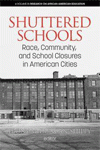
Shuttered Schools
Race, Community, and School Closures in American Cities
Edited by:
Ebony M. Duncan-Shippy, Washington University in St. Louis
A volume in the series: Research on African American Education. Editor(s): Carol Camp Yeakey, Washington University, St. Louis. Rowhea Medhat Elmesky, Washington University in St. Louis. Bronwyn Nichols Lodato, Washington University in St. Louis.
Published 2019
Since the late 1990s, mass school closures have reshaped urban education across the United States. Popular media coverage and research reports link this resurgence of school closures in major cities like Chicago and Philadelphia to charter school expansion, municipal budget deficits, and racial segregation. However, this phenomenon is largely overlooked in contemporary education scholarship. Shuttered Schools: Race, Community, and School Closures in American Cities (Information Age Publishing) is an interdisciplinary volume that integrates multiple perspectives to study the complex practice of school closure—an issue that transcends education. Academics, practitioners, activists, and policymakers will recognize the far-reaching implications of these decisions for school communities.
Shuttered Schools features rigorous new studies of school closures in cities across the United States. This research contextualizes contemporary school closures and accounts for their disproportionate impact on African American students. With topics ranging from gentrification and redevelopment to student experiences with school loss, research presented in this text incorporates various methods (e.g., case studies, interviews, regression techniques, and textual analysis) to evaluate the intended and unintended consequences of closure for students, families, and communities. This work demonstrates that shifts in the social, economic, and political contexts of education inform closure practice in meaningful ways. The impacts of shuttering schools are neither colorblind nor class-neutral, but indeed interact with social contexts in ways that reify existing social inequalities in education.
CONTENTS
The Rise of School Closures in the 21st Century, Ebony M. Duncan-Shippy. SECTION I: PATTERNS AND PROCESSES. School Closure in Strained Cities: Implications for Racial Equity in U.S. Education, Ebony M. Duncan-Shippy. School Closings ... Atlanta Style: The Convergence of Poverty, Segregation, and Achievement, Tomeka Davis, Deirdre Oakley, and Shanae Stover. The Costs and Consequences of School Governance Change in Detroit: From Proposal A to the Education Achievement Authority, Leanne Kang and Kelly E. Slay. An Open and Shut Case: Gentrification and School Closure Decisions in Washington, DC, Esa Syeed. Complicating “Sector” Agnosticism: Relational and Spatial Displacement and Dispossession Through School Closure in Cleveland, Anne Galletta. The Implications of Colorblind Decision-Making About the Closure, Renovation or Rebuild of (Almost) Every School in North Little Rock, Arkansas, Kendra Lowery. SECTION II: IMPLICATIONS. The Effects of Public Elementary Schools Closures on Neighborhood Housing Values in U.S. Metropolitan Areas, 2000–2010, Noli Brazil. “A Spoke in a Wheel”: School Closures and the Continued Violation of Public Trust, Sally A. Nuamah. School Closures and the Political Education of U.S. Teachers, Lauren Ware Stark and Rhiannon M. Maton. Closing Costs: Examining the Impact of School Closures on African-American Students’ Educational Outcomes, Richard O. Welsh and Shafiqua Little. Conclusion: Education Reform in the Racial State: The Costs of School Closures for Marginalized Communities, Ebony M. Duncan-Shippy. About the Editor. About the Contributors.
-
Paperback978-1-64113-608-2
Web price: $45.04 (Reg. 52.99)
-
Hardcover978-1-64113-609-9
Web price: $80.74 (Reg. 94.99)
- eBook978-1-64113-610-5

- EDU054000 - EDUCATION: Urban
- EDU034000 - EDUCATION: EDUCATIONAL POLICY & REFORM: General
- EDU044000 - EDUCATION: Classroom Management
-
 Cultural Capital and Black Education
African American Communities and the Funding of Black
Cultural Capital and Black Education
African American Communities and the Funding of Black
-
 From Disagreement to Discourse
A Chronicle of Controversies in Schooling and Education
From Disagreement to Discourse
A Chronicle of Controversies in Schooling and Education
-
 Living at the Intersections
Social Identities and Black Collegians
Living at the Intersections
Social Identities and Black Collegians
-
 Surmounting all Odds - Vol. 1&2
Equalizing Education Opportunities in the New Millennium (Vol 1 & 2)
Surmounting all Odds - Vol. 1&2
Equalizing Education Opportunities in the New Millennium (Vol 1 & 2)
-
 The Broken Cisterns of African American Education
Academic Performance and Achievement in the Post-Brown Era
The Broken Cisterns of African American Education
Academic Performance and Achievement in the Post-Brown Era
-
 Towards a Brighter Tomorrow
The College Barriers, Hopes and Plans of Black, Latino/a and Asian American Students in California
Towards a Brighter Tomorrow
The College Barriers, Hopes and Plans of Black, Latino/a and Asian American Students in California
-
 Using Past as Prologue
Contemporary Perspectives on African American Educational History
Using Past as Prologue
Contemporary Perspectives on African American Educational History

